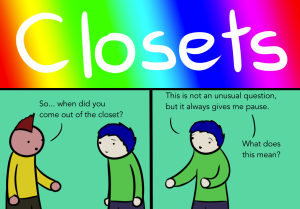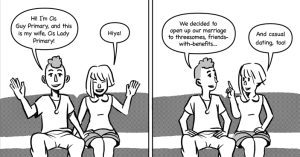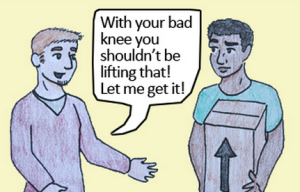
Source: WikiHow
Try having a conversation without using a pronoun: he, she, his, hers, they, theirs.
You’ll find it’s nearly impossible.
In the English language, if you’re referring to one person, you have to gender them. As such, pronouns are an important part of our language. And yet their role in understanding gender can easily go unnoticed.
So what happens when someone identifies as a gender other than that which they were assigned at birth, or has no gender at all?
Trans* people often ask that they be referred to using a different gendered pronoun, and this can be a big part of coming into one’s identity.
New singular pronouns have been invented for folks who may not want to use he or she: ze and hir being the most commonly used, although using the plural pronouns they and them can also be used to refer to a single person.
Changing the pronouns to which someone is referred can be a major part of coming out as trans*. Asking those around you to refer to you with different pronouns may seem like a simple task, but it can often be met with confusion, apathy, and anger.
We live in a country with horribly high amounts of violence against trans* people.
Trans* folks face a host of systemic forms of violence as well, including discrimination in housing and employment.
There’s another layer of violence, and this comes through the way our culture views and speaks about trans* people. The delegitimization and invisibility of trans* identities and their struggle is evident in and perpetuated through language.
While using the right pronouns may seem insignificant, it is a major step in fighting for trans justice. Here’s why:
1. Language Shapes Culture
Because pronouns are so engrained in our language, we often take for granted how necessary they are.
In this way, the issue of using the correct gender pronouns is often disregarded, even by allies, as vain or as a waste of time.
But language has power.
When we use a pronoun that assigns someone a gender with which they do not identify (for example, referring to a self-identified trans man as she), the use of that pronoun can serve to invalidate who that person is and undermine their transition.
Our language is also constantly evolving – and spreading fast, thanks to the Internet – to match the evolution of our culture.
The fact that new pronouns (ze, hir, and many others) have been added and are being used by many trans* people and their allies is really cool and speaks to the fluidity of language and its ability to reflect our ongoing experiences.
In this way, culture shapes language. But language also shapes culture. The words we use can shape how we see the world.
When we use and invent new words to describe people who identify outside of a strict gender binary, we legitimize those ways of being, and participate in the larger struggle for trans* visibility.
We should always be sure to use the words we’re asked to by our trans* friends, even when we’re not around them.
The more we use the correct gender pronouns, the faster the words and their meanings will spread through our communities.
2. Respect Others’ Realities
Trans* people are constantly faced with people and systems who think they know that person’s gender better than they know it themselves.
Doctors, reporters, and politicians often participate in denying trans* people’s realities by labeling them with a gender identifier or name that undermines and negates who they really are.
This is why it’s so important to remember that you do not know more about someone’s gender identity than they do, so it’s not up to you to decide who they are, what to call them, or to make assumptions about their body.
Sometimes, especially when you’re in a position of privilege – and if you identify with the gender you were assigned at birth, you are – it’s best to check that privilege and listen.
Some people (including many in the medical establishment) argue that a trans* person should be referred to by the pronouns of the gender which they were assigned at birth until they have undergone physical surgery or begun receiving hormones to transition. They see the physical change as the marker, or proof, of gender change rather than taking a person at their word.
But this problematic thinking doesn’t consider that these procedures are, to many, inaccessible, invasive, and not necessarily a part of a person’s plan for transitioning.
Further, why must a person alter and modify their body to perfectly fit into another gender category before others will consider calling them by their chosen name?
A discussion around the physical transition assumes that a person wants their body to change – and many do not.
Even then, there’s an assumption that there are only two genders. Many people occupy all different spaces on the gender spectrum, including gender ambiguity and other lovely spaces beyond fixed categories.
It is so important to never make assumptions about a person’s body or to base a gender pronoun on whether or not they have or will transition physically.
In this way, using the pronouns and gender signifiers that someone asks you to use can do a lot in showing your trans* friends (and everyone else) that you respect their reality and their right to decide for themselves who they are how they will be referred.
3. Hold the Media Accountable
The issue of gendered pronouns has been a major topic in the media lately, as mainstream media outlets have seriously struggled to report on the news that Chelsea Manning announced after her trial that she identifies as a woman and would like to be referred to as such.
Although she made it very clear how she would like to be referred, most news outlets continued to report on her story using male pronouns, and many questioned her request.
Thanks to an outpouring of response from trans* activists and allies, many news organizations have since changed their protocol on gender pronouns, setting a precedent for future reporting on trans* people to better fit the needs of the people they’re reporting on.
This is a good thing, considering we’re still seeing dehumanizing and mis-gendering headlines about trans* people like these: Oddly Dressed Man Found in Olmsted Township Pond Identified, Two Men Shot by Pr. George’s Officer Were Dressed as Women, He-She: FDNY Ex Beat Me.
These headlines are not anomalies.
There are scores of headlines and articles referring to “he-shes,” “men dressed as women,” and “transsexual hookers” (regardless of whether they are actually sex workers), and countless articles and news reports referring to trans* women using the pronoun he and to trans men with she.
The media’s often confusing and demeaning reporting on trans* people reflects and perpetuates our larger transphobic culture where language can be used to dehumanize people who act outside their assigned gender.
But as we’ve seen with Chelsea Manning and others, when reporters are called out, they’re likely to change.
When you see a news story about a trans* person that uses incorrect and offensive gender identifiers, call them out!
Write a letter to the editor, write a blog, tell your community. Draw attention to it and encourage them to change.
It’s up to us to challenge the media and hold them accountable to a set of standards that respects people’s gender identities.
4. Fight Transphobia and Sexism
A lot of mis-gendering stems from a general lack of understanding around what it’s like to be transgender, and there’s fear and insecurity around this cultural gap.
But there is also a very real oppression based in systemic sexism around maintaining the male/female binary according to rigid constructs of what those categories mean.
Our culture teaches us that there is something wrong with those who act outside of their culturally assigned gender.
This leads to a policing of trans* bodies – an effort to control and “normalize” people by using pronouns that match a person’s biological sex or their assigned gender rather than those that correspond with their identity.
In this way, actively choosing one’s own gender pronoun and identifier can be a very radical act.
Think about it: The more we challenge the repressive cultural concept that gender roles are natural – that if you are born with a set of genitals then your personality, your interests, and your desires are all predestined accordingly – the more freedom we all have to move about freely within or outside of our culture’s prescribed gender roles and just be who we are.
Being a trans* activist/ally means you’re also working for gender equality.
Encourage your feminist friends to understand how using gender pronouns is also a feminist issue, and why when we stand up for our trans* friends, we’re fighting for a better world for people of all genders.
5. Educate Our Communities
I’m frustrated by the number of times I’ve heard fellow activists exclaim that the pronouns they’re being asked to use by trans* friends confuse them.
There is, of course, some genuine confusion, and that’s why it’s important to be patient when educating others.
But it’s also not that hard to get right, and sometimes it seems people work themselves up over pronouns because they just don’t understand how someone could be trans*.
That’s why it’s so important that we speak up!
Start an ongoing dialogue with the people around you about the issues facing trans* folks and why it’s so important to use the pronouns they’re asked to use.
And of course, allies must always use them.
By using terms that are honest and reflect a person’s gender, allies help legitimize those identities and perpetuate the use of those pronouns in our communities.
—
Trans* folks are doing a lot of hard and necessary work to be seen and respected. It’s the job of allies to support that work by not only maintaining the language that is requested of us, but to call out others.
Using the right pronouns in our own daily language and asking others to do the same isn’t enough to change the extreme transphobia, discrimination, and violence that trans* people experience, but it’s a simple way to use language to show respect for our friends, to make trans* issues visible, and to challenge gender-based oppression.
He, she, ze, they – it’s well worth the work of getting it right.
Want to discuss this further? Login to our online forum and start a post! If you’re not already registered as a forum user, please register first here.
Laura Kacere is a Contributing Writer for Everyday Feminism and is an feminist activist, social justice organizer, clinic escort, and yogi living in Washington, D.C. Laura coordinates the Washington Area Clinic Defense Task Force, teaches yoga with the intent of making it accessible to all, and does outreach for the DC-based sex worker support organization, HIPS. When she isn’t on her mat or at the clinic, she’s usually thinking about zombies, playing violin, eating Lebanese food, and wishing she had a cat. Follow her on Twitter @Feminist_Oryx.
Search our 3000+ articles!
Read our articles about:
Our online racial justice training
Used by hundreds of universities, non-profits, and businesses.
Click to learn more




















